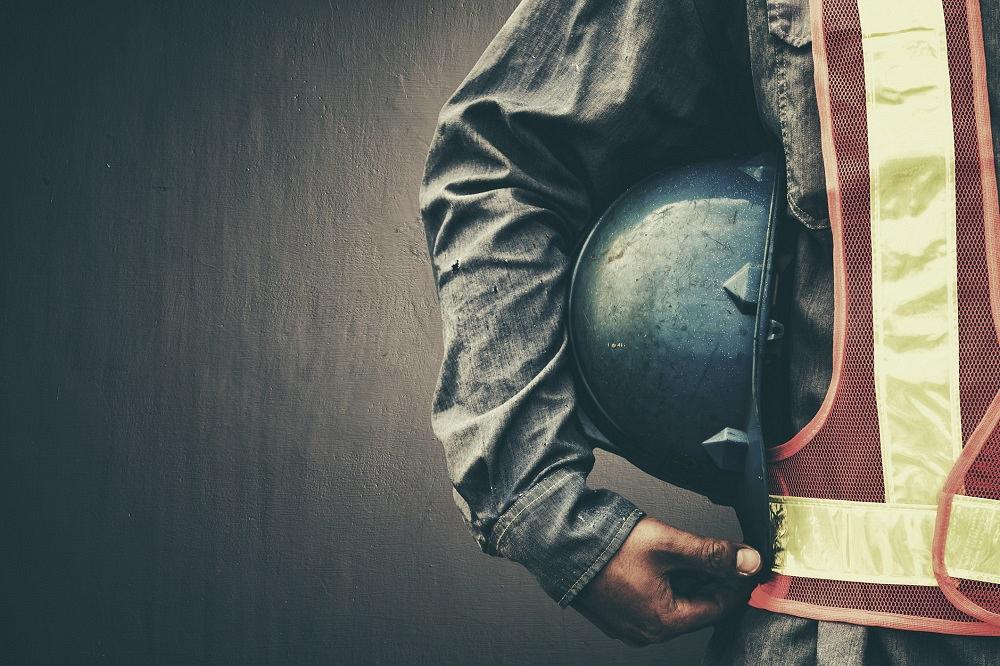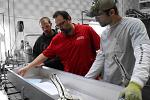Editor-in-Chief
- FMA
- The Fabricator
- FABTECH
- Canadian Metalworking
Categories
- Additive Manufacturing
- Aluminum Welding
- Arc Welding
- Assembly and Joining
- Automation and Robotics
- Bending and Forming
- Consumables
- Cutting and Weld Prep
- Electric Vehicles
- En Español
- Finishing
- Hydroforming
- Laser Cutting
- Laser Welding
- Machining
- Manufacturing Software
- Materials Handling
- Metals/Materials
- Oxyfuel Cutting
- Plasma Cutting
- Power Tools
- Punching and Other Holemaking
- Roll Forming
- Safety
- Sawing
- Shearing
- Shop Management
- Testing and Measuring
- Tube and Pipe Fabrication
- Tube and Pipe Production
- Waterjet Cutting
Industry Directory
Webcasts
Podcasts
FAB 40
Advertise
Subscribe
Account Login
Search
Manufacturing’s problem: Even in this COVID-19 crisis, people don’t see it as essential
One Pennsylvania manufacturer required an appeal process to continue medical part production
- By Dan Davis
- March 27, 2020

Metal fabricating helps maintain a lifestyle that many citizens take for granted. Job shops provide the infrastructure of life, and this crisis is proving that out more correct than ever. Getty Images
Editor's Note: FMA President Ed Youdell is encouraging manufacturers and fabricators to reach out to their respective governors to let them know that metal manufacturing matters during this pandemic. Learn more here.
We talk a lot about boosting the image of manufacturing in the pages of The FABRICATOR, its sister magazines, and on thefabricator.com. The message can get old, especially when most metal fabricators are more concerned with getting parts out the door on a daily basis. But it’s a battle worth fighting. If you need proof, just consider what happened in Pennsylvania this week.
Last week Gov. Tom Wolf ordered “non-life-sustaining” businesses to close in an effort to prevent further spread of the corona virus. That doesn’t sound so unusual, as other governors have enacted shelter-in-place orders, but in identifying which businesses “non-life-sustaining” applied to, Pennsylvania’s leaders included businesses that fall under the “fabricated metal products” sector of the North American Industry Classification System, which covers machine shops and shops involved in “other fabricated metal product manufacturing,” also known in the real world as job shops.
Well, that created confusion in the state. Either shops closed up as instructed, many of which probably were starting to see a slowdown anyway, or they sought to apply for waivers. Whatever the case, some potentially crucial supply lines were interrupted.
Jan Murphy of PennLive shared the story of East Penn Manufacturing Co. in Richmond Township, Berks County, Pa., that shut down the afternoon of March 20 as instructed. Only thing is that the company is a manufacturer of lead batteries that are used in things like medical equipment and emergency and delivery vehicles. You might consider that pretty life-sustaining during these times, correct?
This past Monday, March 23, the manufacturer was granted a waiver, according to a statement from East Penn. But now the company has to ramp back up and adjust to operating with about half of its employees because of social distancing practices. Production obviously is not going to be as robust.
The National Association of Manufacturers sent a note to the Pennsylvania governor asking him to reconsider his definition of “non-life-sustaining.” It also has sent a letter, co-authored by the Business Roundtable and the U.S. Chamber of Commerce, to the National Governors Association asking them to “to take a uniform approach that allows 'essential business' and 'critical infrastructure' to operate as they issue stay-in-place orders."
The letter also stated that “the lack of clarity around what constitutes ‘critical’ and ‘essential’ in such designations ... is hampering efforts to respond to this crisis.”
When you lack central oversight and direction during a crisis, decisions end up being made by several people. That opens the door to what we are seeing now: different rules for different states. Is that the most efficient ways to rally industry to take on an unseen enemy like the U.S. has never seen in recent times?
So remember, the summer camp or open house that seems like a lot of work for little return is actually part of a public relations campaign that is very important. Everybody needs to know that metal fabricating helps them to maintain a lifestyle that many citizens take for granted. Fab shops provide the infrastructure of life, and this crisis is proving that out more correct than ever.
subscribe now

The Fabricator is North America's leading magazine for the metal forming and fabricating industry. The magazine delivers the news, technical articles, and case histories that enable fabricators to do their jobs more efficiently. The Fabricator has served the industry since 1970.
start your free subscriptionAbout the Author

Dan Davis
2135 Point Blvd.
Elgin, IL 60123
815-227-8281
Dan Davis is editor-in-chief of The Fabricator, the industry's most widely circulated metal fabricating magazine, and its sister publications, The Tube & Pipe Journal and The Welder. He has been with the publications since April 2002.
- Stay connected from anywhere

Easily access valuable industry resources now with full access to the digital edition of The Fabricator.

Easily access valuable industry resources now with full access to the digital edition of The Welder.

Easily access valuable industry resources now with full access to the digital edition of The Tube and Pipe Journal.
- Podcasting
- Podcast:
- The Fabricator Podcast
- Published:
- 04/16/2024
- Running Time:
- 63:29
In this episode of The Fabricator Podcast, Caleb Chamberlain, co-founder and CEO of OSH Cut, discusses his company’s...
- Industry Events
16th Annual Safety Conference
- April 30 - May 1, 2024
- Elgin,
Pipe and Tube Conference
- May 21 - 22, 2024
- Omaha, NE
World-Class Roll Forming Workshop
- June 5 - 6, 2024
- Louisville, KY
Advanced Laser Application Workshop
- June 25 - 27, 2024
- Novi, MI































